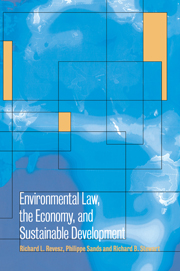 Environmental Law, the Economy and Sustainable Development
Environmental Law, the Economy and Sustainable Development Book contents
- Frontmatter
- Contents
- List of contributors
- Introduction: environmental regulation in multi-jurisdictional regimes
- PART I ENVIRONMENTAL REGULATION IN FEDERAL SYSTEMS
- PART II ENVIRONMENTAL REGULATION AND INTERNATIONAL TRADE
- 4 Environmental protection and the global trade order
- 5 International trade law and international environmental law: environmental taxes and border tax adjustment in WTO law and EC law
- 6 “Environmental protection and the global trade order”: a different perspective
- PART III CHOICE OF ENVIRONMENTAL POLICY INSTRUMENTS
- PART IV THE ENVIRONMENTAL STANDARD - SETTING PROCESS
- PART V INTERNATIONAL ENVIRONMENTAL LAW AND SUSTAINABLE DEVELOPMENT
- Index
4 - Environmental protection and the global trade order
Published online by Cambridge University Press: 03 May 2010
- Frontmatter
- Contents
- List of contributors
- Introduction: environmental regulation in multi-jurisdictional regimes
- PART I ENVIRONMENTAL REGULATION IN FEDERAL SYSTEMS
- PART II ENVIRONMENTAL REGULATION AND INTERNATIONAL TRADE
- 4 Environmental protection and the global trade order
- 5 International trade law and international environmental law: environmental taxes and border tax adjustment in WTO law and EC law
- 6 “Environmental protection and the global trade order”: a different perspective
- PART III CHOICE OF ENVIRONMENTAL POLICY INSTRUMENTS
- PART IV THE ENVIRONMENTAL STANDARD - SETTING PROCESS
- PART V INTERNATIONAL ENVIRONMENTAL LAW AND SUSTAINABLE DEVELOPMENT
- Index
Summary
Introduction
Trade issues are rarely discussed in isolation from other policy issues. The conference that led to the adoption of the Havana Charter for an International Trade Organization was the United Nations Conference on Trade and Employment. The Charter assigned to the stillborn Organization the task of resolving the most pressing economic problems of the late 1940s. It was to work towards full employment and the removal of balance of payments disequilibria of its Members, take action against inflationary or deflationary pressures, and promote fair labor standards. Its Members would have been committed to cooperating in the fields of economic development and reconstruction. And the Organization was to be the forum for negotiating agreements on technology transfer, foreign investment, double taxation, and restrictive business practices, as well as commodity agreements.
The central theme of international economic diplomacy in the 1960s and 1970s was the economic development of the third world, and the GATT's legal regime was gradually adapted between 1965 and 1980 to serve as an instrument of development policy: the principle of non-reciprocity in trade negotiations between developed and developing countries was recognized; developed countries were permitted to accord tariff preferences to developing countries; and developing countries were accorded the right to exchange preferences among themselves in the name of collective autonomy.
The voluntary nature of the preferences accorded to the developing countries induced some developed countries to link the granting of preferences to other policy issues.
- Type
- Chapter
- Information
- Environmental Law, the Economy and Sustainable DevelopmentThe United States, the European Union and the International Community, pp. 107 - 126Publisher: Cambridge University PressPrint publication year: 2000
- 1
- Cited by
